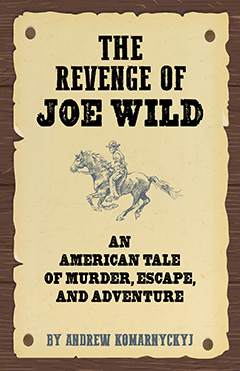Southern Illinois, 1861. Twelve-year-old Joe Wild is on the lam, running away from his hometown where he has been accused (unjustly) of murder. His desired destination is Washington, DC, where he plans to enlist in the Union Army. Along the way, he helps an enslaved man named Billy escape; the two become friends and traveling companions. Once they arrive in Washington, Joe enlists (even though he’s only 12), but Billy is denied enlistment because he’s Black and is sent on his way. The bulk of the novel then turns to vivid accounts of Joe’s time in the Army of the Potomac and the many battles in which he fights. Surviving the war and now 16, he determines to go home and clear his name. Joe tells his story in his own unlettered frontier voice (“The guv’ment had said you warn’t allowed”), which successfully captures a time and place and is especially effective in describing the horrors of war. Yes, the ending is a bit facile, but it’s still satisfying, as is the rest of this idiosyncratic, agreeable work of history.
—Booklist
“Saddle up for Andrew Komarnyckyj’s The Revenge of Joe Wild, a rollicking mid-19th century adventure with high stakes, heart, and a classic voice in Joe Wild to weave this rousing and thrilling tale. I enjoyed it immensely and you should too!”
—Lee Matthew Goldberg, author of Runaway Train and The Ancestor
“The Revenge Of Joe Wild is a hell of a ride. What begins as a lyrical coming-of-age tale turns into an action-packed western adventure that is always full of warmth and humor. Great stuff!”
—Paul D. Brazill, author of Guns Of Brixton
“A thoroughly engaging story about the adventures of Joe Wild . . . . The author writes with a clever use of period, and locality vernacular which nails the reader firmly into 1860s America. . . . A charming, engaging and thoroughly enjoyable yarn from the pen of a talented writer. Highly recommended.”
—Roger A. Price, author of Nemesis
Fans of historical fiction, the American Civil War, and coming-of-age stories will love this one. The Revenge of Joe Wild follows a young boy living in rural Illinois during the years leading up to the Civil War and during the conflict. He’s quite literally “dirt poor,” obtaining most of his food from hunting and trapping in the woods. The story begins with his life in his small town, his framing for murder, his escape, and his time fighting for the north. What’s so engaging and fascinating about this story is that it feels like a Mark Twain or Faulkner novel due to the writing style, but racism, poverty, slavery, and even sexuality are approached from a modern perspective, in that while nothing feels anachronistic, it’s clearly a dissection of these themes. The book is written with a very specific phonetic style that makes it feel like an authentic tale from that era. It’s honestly quite masterful. It’s hard to explain, but the book feels like Twain, but without the problematic language and 19th-century ideology hampering it. Joe’s burgeoning sexuality is addressed, as is the repression of homosexuality. Slavery is shown to be what it was: horrendous, and Joe’s learning curve towards it was realistic for a boy of his age and the time period he lived in. The research that must have gone into this book is incredibly impressive. You can tell that every little thing was considered, from clothing, to the battles, and, as I said, the dialogue and vernacular. What’s really interesting about this novel is that there is no real antagonist. People who seem like they will be villains are just . . . people. Even Joe’s parents, who by today’s standards would be considered terribly abusive and neglectful, were surprisingly human, and Joe’s arc surrounding them was touching. And on top of all this, while I wouldn’t call the novel “funny,” it carries a very interesting tone that is enthralling and hard to classify. It’s unique and hard to put down. Overall, this book is a fascinating slice of life that shows what life for an average white boy was like in the 1860s.
—Whispering Stories
“Joe takes the reader on a journey through America that has a sense of the authentic, whilst remaining pacy and entertaining.”
—SF Book Reviews
“A walk through American history that is an absolute treat to read”
—Rae’s Reading Lounge
“If you’re looking for a rip-roaring adventure, this is a book well worth your time.”
—David’s Book World








